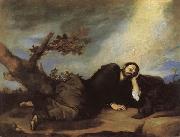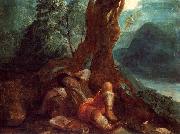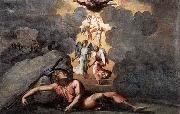Wholesale Oil Painting No Minimum |
|||||||||||
|
|
|||||||||||

|
|||||||||||
|
|
|
||||||||
Jose de RiberaSpanish Painter and Print engraver , 1591-1652 Information concerning the life and personality of Jusepe de Ribera is sparse. He was born the son of a shoemaker in Jetiva, Valencia Province. He appears to have gone to the city of Valencia while still a boy, but nothing is known of his possible artistic training there. As an adolescent, he traveled to Italy and spent time in Lombardy. Next he was in Parma, from which, it is said, he was driven by the contentious jealousy of local artists. He located himself in Rome until an accumulation of debts forced him to flee. Finally he settled in Naples, where in 1616 he married Caterina Azzolino, the daughter of a painter, by whom he had seven children between the years 1627 and 1636. The Academy of St. Luke in Rome elected Ribera to membership in 1625, and 6 years later the Pope conferred upon him the Order of Christ. It is understandably speculated that Ribera revisited Rome for these events. Being sought after in Naples by the Church and the various Spanish viceroys who ruled there in the name of the Spanish monarchy, he dismissed the idea of returning to his homeland. He was quoted as saying that he was honored and well paid in Naples and that Spain was a cruel stepmother to its own children and a compassionate mother to foreigners. Nevertheless, he generally added his nationality when he signed his works. This practice inspired the Italians to nickname him "the Little Spaniard" (Lo Spagnoletto). The last decade of Ribera's life was one of personal struggle. He suffered from failing health, the taunts of other artists that his fame was "extinct," and difficulty in collecting payments due him. Nevertheless, he kept it from being a tragic defeat by continuing to paint until the very year of his death in Naples. Actually, he was the victim of the local politics and finances. Naples was in the throes of a severe economic depression for which the foreign rulers, the patrons of Ribera, were naturally blamed, and the desperate citizenry was rioting in the streets. It is significant that Ribera continued to receive commissions in such a time, even if there was a dearth of payments. Ribera was inventive in subject matter, ranging through visionary spectacles, biblical themes, genre, portraits, mythological subjects, and portraits of ascetics and penitents. |
||||||||
|
|
||||||||
Jacob's Dream
Jacob's Dream Painting ID:: 28560 |
mk61
1639
Oil on canvas
179x233cm
mk61 1639 Oil on canvas 179x233cm |
|||||||
|
|
||||||||
ELSHEIMER, AdamGerman Baroque Era Painter, 1578-1610 German painter, printmaker and draughtsman, active in Italy. His small paintings on copper established him after his brief life as the most singular and influential German artist to follow D?rer. Their grand conception in terms of monumental figures and poetic landscape and their meticulous, miniature-like execution were admired by Rubens and came to influence many 17th-century artists, including Rembrandt. Most were produced in Rome after 1600: |
||||||||
|
|
||||||||
|
|
Jacob's Dream
Jacob's Dream Painting ID:: 32293 |
Oil on copper, 19,5 x 26,1 cm Oil on copper, 19,5 x 26,1 cm |
||||||
|
|
||||||||
RaffaelloItalian painter , 1483-1520 was an Italian painter and architect of the High Renaissance, celebrated for the perfection and grace of his paintings and drawings. Together with Michelangelo and Leonardo da Vinci, he forms the traditional trinity of great masters of that period. Raphael was enormously productive, running an unusually large workshop, and, despite his early death at thirty-seven, a large body of his work remains, especially in the Vatican, whose frescoed Raphael Rooms were the central, and the largest, work of his career, although unfinished at his death. After his early years in Rome, much of his work was designed by him and executed largely by the workshop from his drawings, with considerable loss of quality. He was extremely influential in his lifetime, though outside Rome his work was mostly known from his collaborative printmaking. After his death, the influence of his great rival Michelangelo was more widespread until the 18th and 19th centuries, when Raphael's more serene and harmonious qualities were again regarded as the highest models. |
||||||||
|
|
||||||||
|
|
Jacob's Dream
Jacob's Dream Painting ID:: 51253 |
1518-19
Fresco Loggia on the second floor 1518-19 Fresco Loggia on the second floor |
||||||
|
|
||||||||
|
Raffaello Italian painter , 1483-1520 was an Italian painter and architect of the High Renaissance, celebrated for the perfection and grace of his paintings and drawings. Together with Michelangelo and Leonardo da Vinci, he forms the traditional trinity of great masters of that period. Raphael was enormously productive, running an unusually large workshop, and, despite his early death at thirty-seven, a large body of his work remains, especially in the Vatican, whose frescoed Raphael Rooms were the central, and the largest, work of his career, although unfinished at his death. After his early years in Rome, much of his work was designed by him and executed largely by the workshop from his drawings, with considerable loss of quality. He was extremely influential in his lifetime, though outside Rome his work was mostly known from his collaborative printmaking. After his death, the influence of his great rival Michelangelo was more widespread until the 18th and 19th centuries, when Raphael's more serene and harmonious qualities were again regarded as the highest models. Jacob's Dream 1518-19 Fresco Loggia on the second floor |
||||||||
|
|
||||||||
|
Prev Next
|
||||||||
|
|
||||||||
|
Related Paintings to Raffaello :. |
||||||||
|
|
||||||||
|
CONTACT US |



